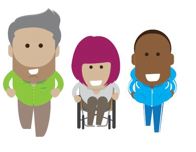Contact Sheffield Children's Continuing Care Team
Telephone: 0114 3051700
Some children and young people (up to age 18), may have very complex health needs.
These may be the result of:
Children with such complex needs may need extra health support. This is extra to what is available from:
This extra package of care is called Continuing Care. The South Yorkshire Integrated Care Board (ICB) assesses children/young people. This is to see if they need a package of continuing care. The South Yorkshire ICB are responsible for arranging health services in South Yorkshire.

Any child/young person up to their 18th birthday who has a complex health need may qualify.
When a young person reaches 18, they could move to adult NHS Continuing Healthcare. See Continuing Care when becoming an adult below.
A referral can be made by any health, social care or education professional. This is if they feel a continuing care package may be needed for the child/young person. Families can ask a professional to put in a referral.
When referred for an assessment, the ICB will first check if they are likely to need a full assessment. This is through a screening checklist. An example of this checklist can be seen here.
A health assessor will then collect evidence of the child’s needs. This draws on the advice of health and care professionals. A national framework provides guidance. It gives a set of categories of needs to support decisions on whether a child has a continuing care need.

An important part of the assessment is to ask for the child/young person and their family's views.
The assessment will look at the current care being provided. A decision on whether a child/young person has a continuing care need is based on:
The health assessor will make a case to a panel of experts. They make a decision if the child or young person has a continuing care need. They base this on:
A decision is usually made 6-8 weeks from referral.
Depending on the decision, a package of care is then agreed. Some of this care may be provided through existing services. Some may need to be specially arranged.
The ICB will keep the package of care under regular review. This is to make sure the child/young person’s needs continue to be supported.
A child or young person’s eligibility for continuing care may change as their needs change.
Telephone: 0114 3051700
Young people who have children's continuing healthcare, may be eligible for NHS Continuing Healthcare. This is continuing healthcare for adults. They don't automatically qualify to receive this. The young person would need to have a new assessment for adult continuing healthcare. This is part of transition planning.
The ICB will assess any young person in receipt of continuing care at age 16-17. This is to see if they are likely to be eligible for NHS Continuing Healthcare when they turn 18.